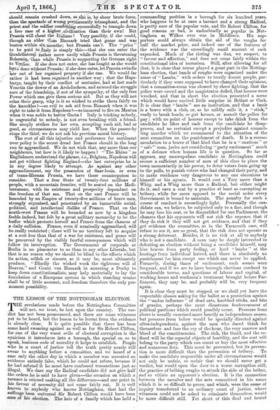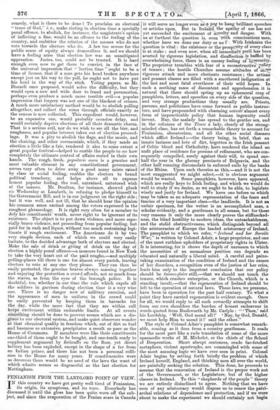THE LESSON OF THE NOTTINGHAM ELECT - 113N.
THE revelationsmade before the Nottingham Committee will not, we trust, be lost upon the country. The ver- dict has not been pronounced, and there are some witnesses yet to be heard, but the lesson to be learnt from the evidence is already clear. It is quite possible that there has been some hard swearing against as well as for Sir Robert Clifton, for one of the very worst evils of electoral corruption is the cynicism it introduces into a borough, the special .or, so to speak, business code of morality it helps to establish. People -who in a court of justice tell the truth pretty nearly will swear to anything before a corseeittee, and we heard of a case only the other day in which a member was unseated on evidence entirely false, which he could not refute, because if he had refuted it he must have confessed transactions just as illegal. We dare say the Radical candidate did not give half the ordeal lie is said to have given—the occasion on which a menace is uttered making all the difference—and one point in his favour of necessity did not come fairly out. It is well known to anybody who knows Nottingham, that had the suffrage been universal Sir Robert Clifton would have been sure of his election. The heir of a family which has held a commanding position ia a borough for six hundred years, who happens to be at once a baronet and a strong, Radical, is pretty sure of the popular vote, and Sir Robert Clifton, for good reasons or bad, is undoubtedly as popular in Not- tingham as Wilkes ever was in Middlesex. His sup- porters could always obtain the aid ef the roughs for half the market price, and indeed one of the features of the evidence was the exceedingly small amount of cash expended. Much of the rioting was dun, we suspect, to "favour and affection," and does not come fairly within the constitutional idea of terrorism.. Still, after allowing for all that, it is clear that terror played a great part in the Notting- ham election, that bands of roughs were arganized under the name of "Lambs," with orders to terrify decent people, par- ticularly if they were supposed to have changed their opinions, that a committee-room was cleared by sheer fighting, that the police were cowed and the magistrates defied, that houses were wrecked, and that in short the election presented a scene which would have excited little surprise in Belfast or Cork. It is clear that " lambs " are an institution, and that a lamb is a bravo with a club, or, as he mildly calls it, a "stick," ready to break heads, or gut houses, or assault the police for pay ; with no point of honour except to take drink from the candidate he likes and cash from the candidate he disap- proves, and no restraint except a prejudice against commit- ting murder which we recommend to the attention of the next committee on the punishment of death. It is a recom- mendation to a bravo of that kind that he is a " cautious " or " safe " man, juries not considering "party excitement" much of a defence when human life is in question. So far as appears, any unscrupulous candidate in Nottingham could secure a sufficient number of men of this class to place the town momentarily in his power, to deter voters from going up to the polls, to punish voters who had changed their party, and to make residence v.ery dangerous to any one obnoxious to himself or his agents. It would cost a Tory more than a Whig, and .a Whig more than a Radical, but either might do it, and earn a seat by a practice at least as corrupting as bribery, while f ar more opposed to the social order every Government is bound to maintain. The penalty for such a course of conduct is exceedingly light. Personally the can- didate can, we believe, be subjected only to a fine, and though he may lose his seat, or be disqualified for one Parliament, the chances that his opponents will not risk the expense, that if they do risk it they will not get evidence, and that if they get evidence the eommittee, as in the Yarmouth case, will refuse to see it, are so great, that the risk does not operate as a strong deterrent. Besides, it is no risk at all to anybody who is not a candidate. A man may be deeply interested in defeating an election without being a candidate himself, may hire bravos from party feeling, or hurl " lambs " at the hustings from individual hatred, and there ie absolutely no punishment for him except one which can never be applied. Formerly, during times of excitement, such scenes were frequent, and if we are to have borough elections confined to considerable towns, and questions of labour and capital, of working hours and workmen's treatment brought before Par- liament, they may be, and probably will be, very frequent again. It is clear they must be stopped, or we shall yet have the respectable classes asking for the ballot as a protection against the "undue influence " of dead eats, kuobbed sticks, and bits of granite, perhaps the most disastrous bouleversernent of political positions which could possibly occur. Pressure from above is usually exercised more heavily as independence ceases, but pressure from below would be specially directed against ultra-independents, against the men who dared think for themselves and face the cry of the hour, the very marrow and blood of the constituencies. The rich, the timid, and the re- fined -will be the especial objects of hostility, and the seat will belong to the party which can count or buy the most effective and numerous fists. This must be prevented, but its preven- tion is more difficult than the prevention of bribery. To make the candidate responsible under all circumstances would not only be unfair, so unfair that we should never get a verdict, but would open the door to a worse corruption still, the practice of bribing roughs to attack the side of the briber, and so vitiate an opponent's election. It is the connection between the member and the acts committed in his name which it is so difficult to prove, and which, were the scene of inquiry transferred to an ordinary court of justice, where witnesses could not be asked to criminate the selves, would be more difficult still. Yet Short of this final and brutal remedy, what is there to be done ? To proclaim an electoral "truce of God," i. e., make rioting in election time a specially penal offence, to abolish, for instance, the magistrate's option of inflicting a fine, would be an offence to the feeling of the country, and embitter the relation of the masses who do not vote towards the electors who do. A law too severe for the public sense of equity always demoralizes it, and we should have a feeling arise that election law was an unmitigated oppression. Juries, too, could not be trusted. It is hard enough even now to get them to convict, in the face of the universal impression that " 'lection time " ought to be a time of license, that if a man gets his head broken anywhere except just on his way to the poll, he ought not to have put his head in the way of the stick. Voting papers, as Mr. Disraeli once proposed, would solve the difficulty, but they would open a new and wide door to fraud and personation, perhaps even produce a much more terrible evil—a popular impression that forgery was not one of the blackest of crimes. A much more satisfactory method would be to abolish polling altogether, and collect the votes through officials exactly as the census is now collected. This expedient would, however, be an expensive one, would probably occasion delay, and would certainly deprive elections of all their dramatic charm. That is a serious evil, nor do we wish to see all the birr, and roughness, and popular interest taken out of election proceed- ings. It was a pity to abolish the flags, and the music, and the chairing, and other ceremonials, which, if they made an election a little like a fair, rendered it also to some extent a great popular festival—helped to enable the people to see how completely the ultimate control of affairs rested in their own hands. The rough, fresh, popularis aura is a genuine and most valuable element in any constitutional government, serves very often to drive away a good many mists raised by class or social feeling, enables the electors to brand political treachery, and helps above all to express honest popular feeling, the real, untrained, untutored wish of the masses. Mr. Doulton, for instance, showed pluck on Wednesday at Lambeth, in refusing to pledge himself to the Government Bill, and is in our judgment on the right side; but it was well, and not ill, that he should hear the opinion his common sense excited among the voters expressed in the roughest phraseology. It is right very often for a member to defy his constituents' wrath, never right to be ignorant of its existence. The object is to put down violence, and more espe- cially bravo violence, not proceeding from popular feeling, but paid for in cash and liquor, without too much restraining legi- timate if rough excitement. The Americans do it by two very simple devices, each of which we could very easily imitate, to the decided advantage both of electors and elected. Make the sale of drink or giving of drink on the day of election a highly penal offence—a measure found in New York to take the very heart out of the paid roughs,—and multiply polling-places till there is one for almost every parish, leaving electors to vote at any one they please. They can then be easily protected, the genuine bravos always massing together and enjoying the protection a crowd affords, not so much from the staves, as from the eyes of the borough police. It is doubtful, too, whether in our time the rule which expels all the soldiers in garrison during election time is a very wise one. There is no danger now of military coercion, and the appearance of men in uniform in the crowd could be easily prevented by keeping them in barracks for the day, while the mere fact that they are within call keeps excitement within endurable limits. At all events • something should be done to prevent scenes which are a dis- grace to our electoral system, and make quiet observers wonder at that chemical quality in freedom which, out of dirt so foul and baseness so extensive, precipitates a result so pure as the House of Commons. If members were like their constituents one-third of them ought to be bought, and one-tenth ready to supplement argument by fisticuffs on the floor, yet direct bribery has been exploded, except in the shape of a fee from an Indian prince, and there has not been a personal colli- sion in the House for many years. If constituencies were as decorous there would be no need of the laws the want of which admits scenes so disgraceful as the last election for Nottingham.































 Previous page
Previous page